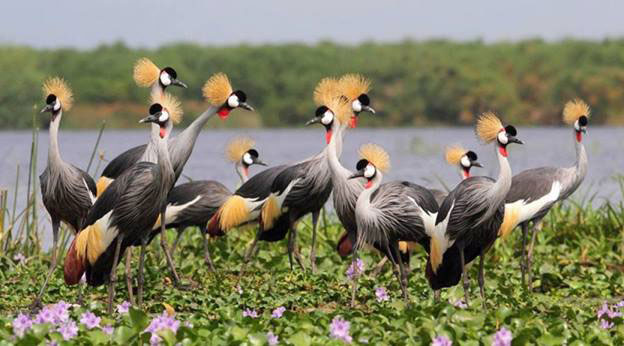
Lwengo, Uganda | THE INDEPENDENT | Farmers in Lwengo district have received specialized training on managing the invasion of Crested cranes, instead of poisoning them.
The farmers have for years decried the persistent crop invasion by the country’s precious bird which has left their communities plunged into food shortage. The most affected farmers are in Lwempaama, Kyandazima, Kamusoga, Kisaana, Kyakabandagala, and Kajjalubanda communities around the Kiyanja-Kaku, one of the largest wetlands and crested cranes breeding sites in the district.
Gilbert Tayebwa, a conservation program officer attached to the International Crane Foundation (ICF) says that the farmers have been poisoning the cranes to protect their crops because they did not know about the different deterrent mechanisms to protect their gardens from invasion. He says that others would spend a lot of time in the garden scaring the birds away.
Records from the International Crane Foundation (ICF) indicate that 110 cranes have been killed by poisoning since March 2021. The new deterrent mechanisms include the use of shiny materials such as videotape films, compact disks, and plastic bottles which are tied to ropes across and around the gardens to scare the cranes.
Tayebwa says they are also looking at introducing agroforestry interventions to plant trees and cassava since the cranes do not like places with trees. He noted that the challenge they have found in effecting the agroforestry program is the land acquisition since the majority of farmers in Lwengo hire land for cultivation making it difficult to dictate to plant trees on such land.
Enid Kesiga, one of the affected farmers says they previously used scare-crows to deter the cranes but they would get used to them in a few days. She hopes the new deterrent mechanisms which has been demonstrated will help to scare the birds and protect their cops.
Mutwalibu Mugumya believes that with the new deterrent mechanisms, they will get relief and protection of their gardens at the same time. Although the farmers had resorted to poisoning the birds, Mugumya says that a combination of shinny videotape films, compact disks, and plastic bottles may help the human-crane co-existence.
Godfrey Mutemba, the District Natural Resources Officer says that the farmers had encroached on the Kiyanja-Kaku wetland which encouraged the easy invasion of their crops. He noted that several wetlands have not been gazetted to get full protection from encroachment.
*****
URN
 The Independent Uganda: You get the Truth we Pay the Price
The Independent Uganda: You get the Truth we Pay the Price


